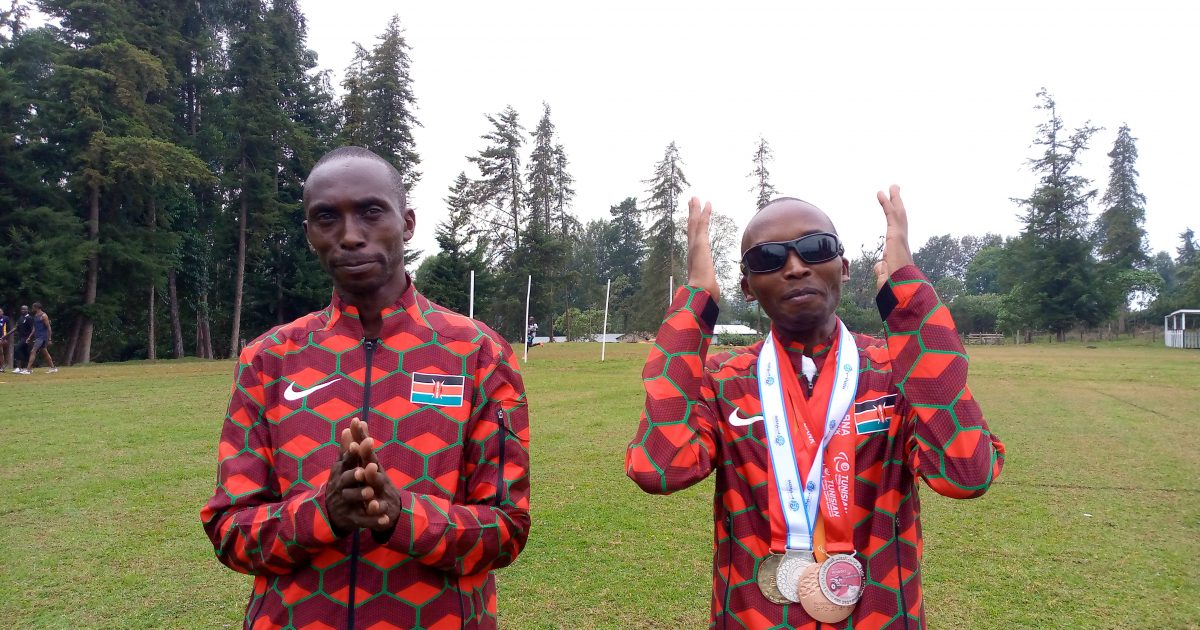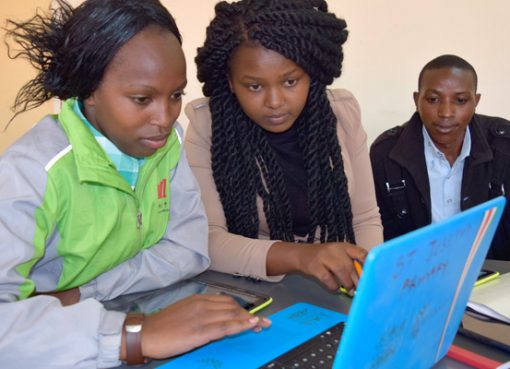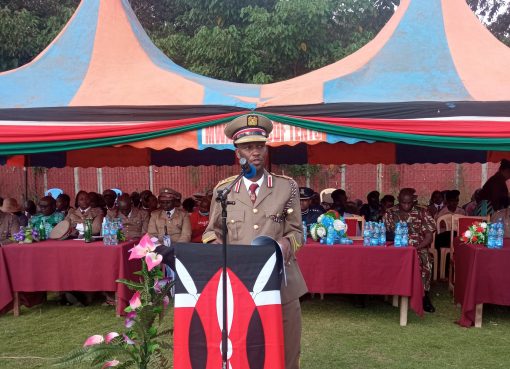Disability is not inability, the story of Paralympian, Wilson Bii, is one of the success despite his visual impairment.
A resident of Kapsaos village within Kericho County, the visually impaired athlete with over ten medals, has exemplary track records in World Paralympic Games and is not about to quit, as he stretches his physical abilities to the bones.
Bii, 34, is a visually impaired athlete ,competes in the T11-1500m and T11-5000m categories and qualified for the Tokyo 2020 Paralympics, after attaining an impressive qualifying performance in the Tunis World Para-Athletics World Grand Prix in March last year. He won gold in the men’s category T11- 5000m and silver in the T11-1500m.
The same year in April, Bii competed in Morocco Paralympics World qualifier trials in the same categories and bagged gold in the T11-5000m and silver in the T11-1500m, where he ran alongside able-bodied athletes.

In 2019 the visually impaired athlete competed in the Morocco Paralympics world qualifier trials in the same categories, and nailed a gold medal in the T11-5000m and bronze in the T11-1500m.
Bii adds that he failed to bring any medal in the two categories during the Tokyo 2020 Olympic Games held in August, as the brutal heat took a heavy toll on his performance.
He featured in the 2016 Paralympic Games held in Rio- de- Janeiro, Brazil, securing a bronze medal in the T11-5000m and failed to win any medal in the 1,500m as the guide he ran with at the time, was nursing an injury.
The father of one was born normal, but his life took a somersault in April 2001, when a vehicle he was travelling in was involved in a head on collision at Ikonge area in Nyamira County.
He went into a coma for three days following the serious injuries he sustained, his left eye popped out of its socket, he sustained a fracture on his right arm and suffered chest injuries which saw him spend a month at a Kericho hospital.
Bii left hospital without his sight, a condition that took him long to accept.
At the time, he was only 13 years old. “It never dawned on me that at a point in my life, I would one day lose my sight. I could not comprehend how I would go about my life without my eyes and at some point, I even contemplated suicide. It was a towering moment for me when I left the hospital without my sight. I was very stressed because discrimination and stigma was the order of the day and I endured a lot of this because I felt worthless, and a nobody in my family,” he says.
He accredits his outstanding performance in his athletics career to his former teacher, Mr. Tanki Boxer, of Ole Sankale Boarding Primary School in Narok County, who was informed of his condition and made a visit to his home at Kapsaos village within Kericho County.
“I met Mr. Boxer who was a teacher at Ole Sankale Boarding Primary School in 2001, it is a special school, but I did not see myself studying. My love was athletics and it was him who saw my talent in this sport. I did not accept my condition, and when he came to visit me at our home, he did encourage me to go back to school while revealing that there were other students at the school who were visually impaired, and were taking their classes using Braille. I did not accept his proposal, but he later on agreed after he asked if I was good at running, to which I responded in the affirmative,” says Bii.
He discloses that in January 2002, Boxer informed him of some school games competition which were to take place in Kisumu which he took part and performed well.
“I performed very well in the 100m, 400m and 800m race categories as well as long jump and shot put. I was proud of my performance in the school games, but I still did not have the urge to continue with my education. I realized my future was bright in sports and made a decision to pursue a career in athletics. Mr. Boxer told me to continue with my education but the situation at home was wanting; where my two siblings and I were under the care of our elderly grandmother, who at the time could not afford to raise school fees for all of us. Mr. Boxer informed me that I would get a bursary from the Municipal County and concluded that it was important that I continue with my education but I did not still agree to this,” reiterates Bii.
In 2003, Mr. Boxer visited Bii again at his home and convinced him to take part in a race competition in Nakuru and was later enrolled in Kericho to study Braille at Kipchimchim Hostels, but he discontinued his schooling and went back home ,owing to the fact that he had not made up his mind to go back to school.
Boxer encouraged him again to continue with his education and Bii opened up to him but he was worried that he would not be able to raise his school fees, to which he was informed that a sponsor was eagerly waiting to pay his school fees, and to this he accepted.
In March 2004 he was enrolled back to school, in class four.
“The reason behind me accepting to go back to school, was not that I was interested in education, but my first exam I attained 256 marks to my surprise and I realized I was capable of learning Braille. My second exam I attained 331 marks and on reaching class six, school fees, the fear of not pursuing to my secondary school education arose. I knew I would not have school fees paid, so I settled to pursue talent in athletics and being in the school would help me refine my skills in running to secure my future,” says Bii.
“My classmates taunted me that I would never get to be successful if I failed to go on with my education, but this did not deter me to go after my dreams of one day representing Kenya in the Olympic Games, and there was no turning back after I heard of Henry Wanyoike who was a celebrated Paralympian at the time, and I knew I wanted to walk in his footsteps,” adds Bii.
After completing his class eight in 2008, Bii moved to Kericho were he started training to perfect his athletic skills.
In July 2009, he took part in the Paralympic National Trials that were held at Moi International Sports Centre Kasarani in Nairobi, where qualifying athletes were to take part in the All-Africa Games, where he took part in the T11-5000M race and emerged third.
The competition which was to take place in Ethiopia was cancelled, dashing all his hopes of making his international debut into the Paralympic games.
Lady luck smiled again and this time Bii made his first appearance to the 2012 London Paralympic Games, but unfortunately his joy was short-lived as he did not manage to complete the T11-5,000m race because of an ankle injury that he was nursing.
Bii has a guide, Robert Tarus, who has been training with him for the last eight years. Visual impaired sprinters race with a guide, who is attached to them with a band at the wrist or hand.
“My guide Tarus plays an important role to my races, he provides everything a runner with a vision has, he tells me how far they are on track to where they are and what I must do to win. I thank him for being by my side all these years,” says Bii.
This year, Bii who trains two times every day at 5.40am to 7am and 4.30pm to 5.30pm is currently training for the Dubai 2022 World Para Athletic Championships, slated for next month.
“My focus is to do well and set myself up for future successes in international races. I can’t predict what will happen but I will trust in God. My training is also going on well and I am mentally and physically ready for the competition,” adds Bii.
By Sarah Njagi





